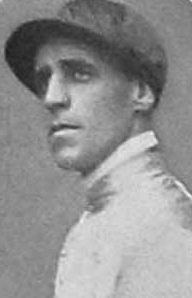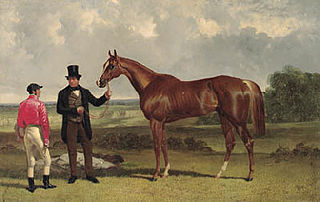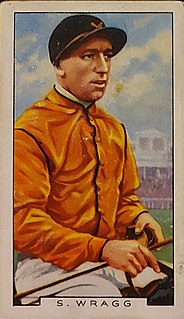Major wins
- St Leger Stakes – Ruler (1780), Paragon (1786), Spadille (1787), Young Flora (1788), Tartar (1792)
| John Mangle | |
|---|---|
| Occupation | Jockey |
| Born | 1751 Hauxwell, near Leyburn, North Yorkshire |
| Died | 1 January 1831 Middleham, North Yorkshire |
| Major racing wins | |
| Major race wins: St Leger Stakes (1780, 1786, 1787, 1788, 1792) | |
| Significant horses | |
| Paragon, Ruler, Spadille, Tartar, Young Flora | |
John Mangle was an English flat racing jockey and trainer, who was five time winning rider in the St Leger Stakes.
He served his riding apprenticeship with Isaac Cape in Middleham, North Yorkshire, before joining John Hoyle's stable. He married Hoyle's daughter Hannah and took over the stable when Hoyle died, [1] employing John Jackson and Ben Smith as jockeys.
He went on to both train and ride the winners of three consecutive St Legers - Paragon in 1786, Spadille in 1787 and Young Flora in 1788, all for Lord Archibald Hamilton. A further potential winner, Zango, was disqualified after passing the post first in 1789. [2] Off the back of these successes, he built a second stable nearby at Brecongill. [3] Blindness forced him to retire from training [4] and he died at Middleham on 1 January 1831. [3]
As a younger man, he had the nickname "Crying Jackie" for his tendency to cry after losing. [2]

Francis Buckle (1766–1832), also known as Frank Buckle and known to the British horse racing public as "The Governor", was an English jockey, who has been described as "the jockey non-pareil" of the opening quarter of the 19th century, and the man who "brought respectability to race-riding". He won at least 27 British Classic Races during his career, a record which would not be beaten for over 150 years.
Geoff Lewis is a Welsh retired jockey who was born in Talgarth, Breconshire.
Robert Robson (c.1765–1838) was a horse trainer, known as the Emperor of Trainers who ran "the outstandingly successful stable of the first quarter of the 19th century."The leading racehorse trainer of his time, he raised their status from glorified groom to professional.

Tom Cannon Sr. was a British flat racing jockey and trainer. He won 13 British classics as a jockey, becoming champion in 1872. As a trainer, he trained classic winners, as well as winners over jumps, including the 1888 Grand National. He was the father of four jockey sons, including the six-times champion, Morny Cannon, and the great-grandfather of eleven-times champion, Lester Piggott.
John Singleton, was an English horse racing jockey of the late 18th and early 19th century. He was actually the third John Singleton from the same family to achieve prominence in racing circles, following his father John and his great uncle John.

Joseph Childs (1884–1958) was a French-born, British-based flat racing jockey. He won fifteen British Classics in a 35-year career, the last ten years of which were spent as jockey to King George V. He was known for riding a slow, waiting race, and also for having a short temper which regularly saw him at odds with his trainers and owners.

William Clift (1762–1840), born Wentworth, South Yorkshire, was a British jockey. He won the first runnings of both the 1,000 Guineas and 2,000 Guineas and was the first jockey to win all five of the British Classics.

Samuel Chifney Jr. was an English jockey. He was the younger son of a prominent 18th century jockey, also called Samuel Chifney. In terms of talent, he reportedly outshone all his peers, but "he owned a self-destruct button and had a fatal tendency to press it". This failing meant "his talent was not converted into the kind of concrete achievement that stands the test of time".

Dennis Fitzpatrick (1764–1806) was an Irish, five-times British Classic winning jockey. He was the first Irish professional jockey to ride in England and competed in some of the most notable match races of the 19th century versus fellow jockey Frank Buckle.
John Shepherd was a four times British Classic-winning jockey and trainer. He was a pioneering Northern jockey, one of the few of his time to move south to Newmarket, the home of British horse racing and gain a reputation there.

Job Marson (1817–1857) was an English classic-winning jockey, whose most famous partnership was with Voltigeur, winner of the 1850 Derby and St Leger.
Harry or Henry Grimshaw was an English jockey, most famous for winning the British Triple Crown in 1865 on Gladiateur.

Thomas French (1844–1873), born in Liverpool, was a Derby winning English jockey.

Frederic E. Webb was a British Classic winning jockey.

John "Knickerbocker" Reiff, often called Johnny, was an American flat racing jockey, whose greatest successes came in Great Britain where he won three Classics.

Michael Beary was an Irish flat racing jockey, who won four British Classics and eight Irish Classics in a career that spanned from the 1910s to the 1950s. He was Irish Champion Jockey in 1920.
Eric Ephraim Smith was an English flat racing jockey, who rode over 2000 winners, including the winners of three Classics, in a career spanning over 30 years.

Sam Wragg was an English flat racing jockey, who won all of the British Classic Races except the St Leger Stakes in a successful career that straddled World War II.
William Nevett was an English flat racing jockey, who won three wartime Derbies and formed a famous partnership with Dante, one of the horses of the century.

Frederick Edward Rickaby was an English flat racing jockey, who won three fillies' Classics. He is usually referred to as Fred Rickaby Sr. to distinguish him from his son and grandson, both successful jockeys in their own right.